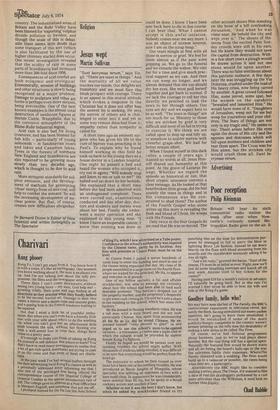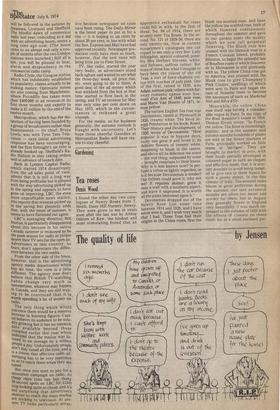Charivari
Kung phooey
Kung Fu, I can't get away from it. You know how it is with a craze, it's like an earthquake. One moment you know nothing about it, the next it swallows you up. And I'm not talking just about the telly programme, the films and the newspaper articles.
These days I can't come downstairs .without seeing two young louts — my sons, God help me! — gyrating wildly, their arms and legs flailing in all directions as they practise what they fondly believe to be the ancient martial art. Damage to date: two vases, a mirror and a dozen cups and saucers gone, and a gaping hole in the French windows waiting to be repaired.
Not that I mind a little bit of youthful enthusiasm. But when you can't even have a friendly little row with your wife about who's to do the washing UP, when you can't give her an affectionate little Push towards the sink, without her flooring you With a well-aimed foot in your face, things have come to a pretty pass.
It's enough to make you think of taking up Kung Fu yourself in self-defence. But where to learn? You don't have to read many newspapers to realise that a lot of get-rich-quick merchants are trying to cash in on the craze and that most of them are charlatans.
In the past week I've had several leaflets through the door advertising local Kung Fu classes as well as a personally addressed letter informing me that I was one of the privileged few being offered the correspondence course of the Imperial College of Oriental Combat at the special introductory rate of £45. The college gave its address as a Post Office box in Newport Pagnell, and somehow that put me off. 1 plumped instead for the Ha Lee Hai Amz School
of King Fu, which I saw adv.ertised on a Tube poster, Confidence in the school's authenticity was inspired by the Chinese name, partly bu its location. Any. firm with premises at Centre Point, must be on the level.
At Centre Point I joined a queue hundreds of yards long to enter the building and enrol in one of the classes being organised that day. My class of 30 people assembled in a large room on the fourth floor, where we waited for the principal, Mr Ha, to appear and welcome us in person.
One of my fellow recruits, a fat and affable stockbroker, was able to assuage my curiosity about how the school had been able to land such desirable premises. -The bottom's dropped out of the property market, and the proprietor's desperate to get some cash coming in. I'm told he's sold a share in the building to the school, which has some rich backers."
Mr Ha dressed in flowing mandarin robes. He was a tall man with a little beard and did not look particularly Chinese. Nor, apart from pronouncing all his Rs as Ls, did he sound Chinese. He expressed himself "velly pleased to gleet" us and urged us to use the school's soon-to-be-opened facilities — a restaurant, a casino and a night club in which the cabaret would be provided by topless female Kung Fu fighters.
Finally he hoped we would be patient over any teething troubles the school might suffer. With thousands of students being enrolled, it was difficult • to be sure that everything would be perfect from the word go. The instructor to whom he then turned us over must have been one of the teething troubles. He was introduced as Baron Jenghis of Mongolia, whose speciality was splitting an opponent in two with a bare hand chop. In appearance he was considerably more oriental than Mr Ha, but he spoke in a broad cockney accent and smelled of beer. Whether or not it was the beer I don't know, but when he asked my stockbroker friend to try
opec-Lator July 6, 1974 Will be followed in the autumn by Swansea, Liverpool and Sheffield. The blissful dawn of commerical radio last year, coinciding as it did With an advertising boom, seems a long time ago now. (The boom came to an abrupt end only a couple of months after the two London stations were launched.) Still all is not, you will be pleased to hear, alarm and despondency in the commercial radio camp.
Radio Clyde, the Glasgow station Which has indubitably established its popularity, claims actually to be making money. Optimistic noises are also coming from Manchester, Where Piccadilly has taken more than £400,000 in ad revenue in its first three months and expects to make it £1 million by the end of the twelve month.
Metropolitan, which has the distinction of having been founded by a group of broadcasters rather than businessmen — its chief, Bruce Lewis, was with Tyne Tees Television — says initial advertising response has been encouraging, and the first fortnight's air time is already booked up. Sheffield's Radio Hallam is also taking orders well in advance of launch date.
Back in London Capital Radio, Which started 1974 disastrously from the ad sales point of view, admits that it is still a long way from being profitable but is pleased With the way advertising picked up In the spring and appears to have gone on improving. LBC, the even more unprofitable news station, also reports that revenue picked up In the spring but gloomily adds that, with the onset of summer, It seems to have flattened out again. LBC's managing director, Bill Hutton, is particularly disappointed about this because in his native Canada summer is reckoned to be the peak season for radio as people desert their TV sets for the open air. Advertisers in this country, he fears, don't appreciate the difference between the two media.
From the other side of the fence, however, that is the advertising agency media departments which buy air time, the view is a little different. The agency men don't believe that British TV-watching habits change very much in 1-immertime, whatever may happen in Canada, and they are still waiting to be convinced that it is Worth spending a lot of money on radio.
The only thing which would convince them would be a massive increase in listening figures. Capi tal believes its audience to be steadily growing but it has no research data available beyond those compiled earlier this year which itildicated that the station was lis
ened to on average by a million Pecale
a day. Unfortunately people don t stay tuned all the time, and it is a truism that effective radio advertising has to be very repetitive
SO as to catch them when they are tuned.
But once you start to pay for a saturation campaign on radio, its cheap rates (you can buy thirty 30-second spots on LBC for £330) stop looking quite so cheap, and it's not, surprising that advertisers anxious to reach the mass market are sticking to television. At present TV looks particularly attrac
tive because newspaper ad rates have been rising. The Daily Mirror is the latest paper to put in for a rise — it is hoping to up rates by about 20 per cent, in line with what the Sun, Express and Mail have had approved recently. Newspaper production costs have risen so much, however, that the new rates will bring little joy to Fleet Street.
TV, like radio, started the year very badly, as advertisers stood back aghast and waited to see what the three-day week, oil price rise, etc. were going to do to them. A good deal of the ad money which was withheld from the box at that time started to flow back in the spring, and TV ad revenue for May was only nine per cent down on May 1973, which in the circumstances is reckoned a great triumph.
For the media, as for business generally, the autumn outlook is fraught with uncertainty. Let's hope those cheerful Geordies at Metropolitan Radio will have reason to stay cheerful.



































 Previous page
Previous page